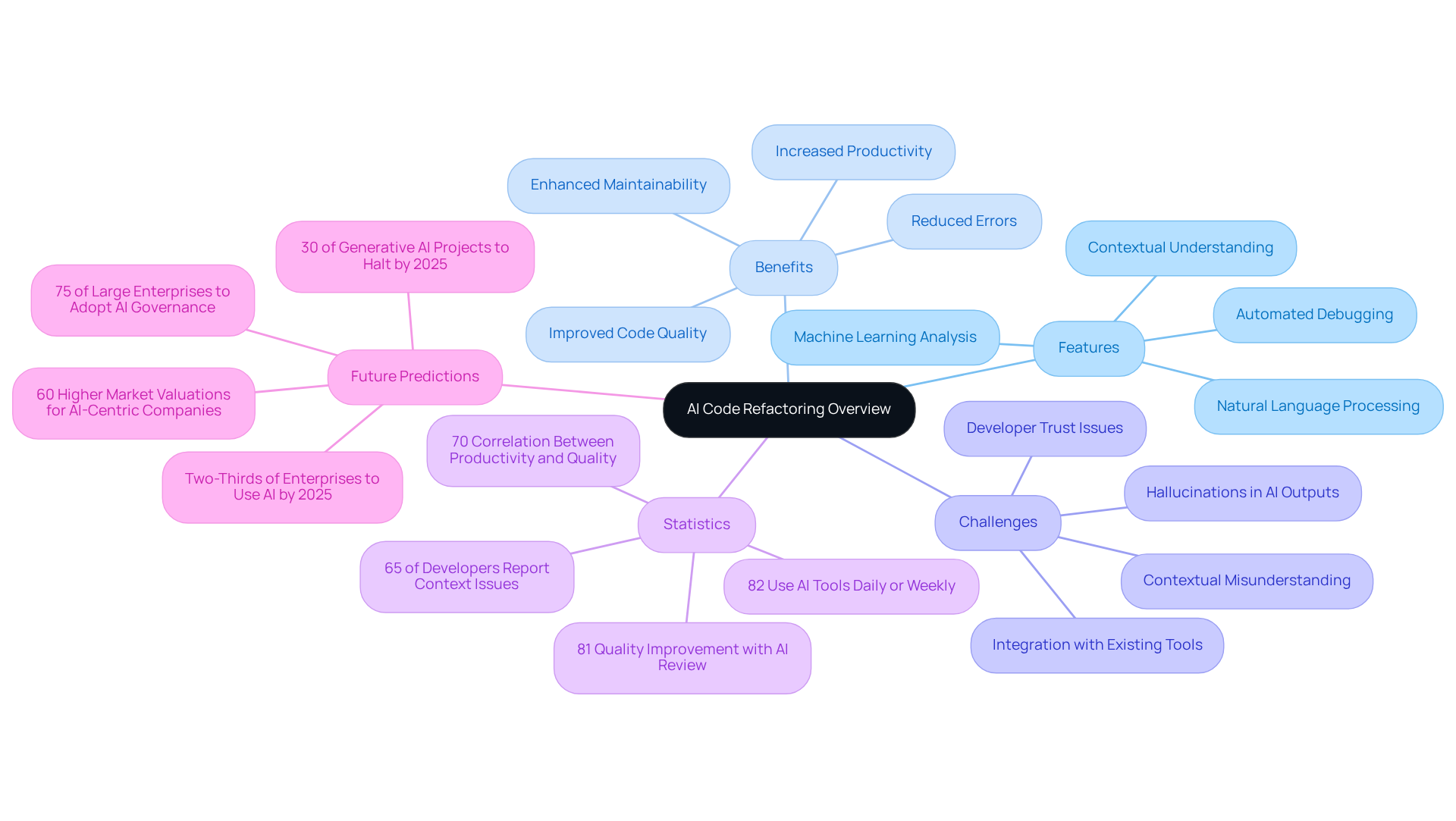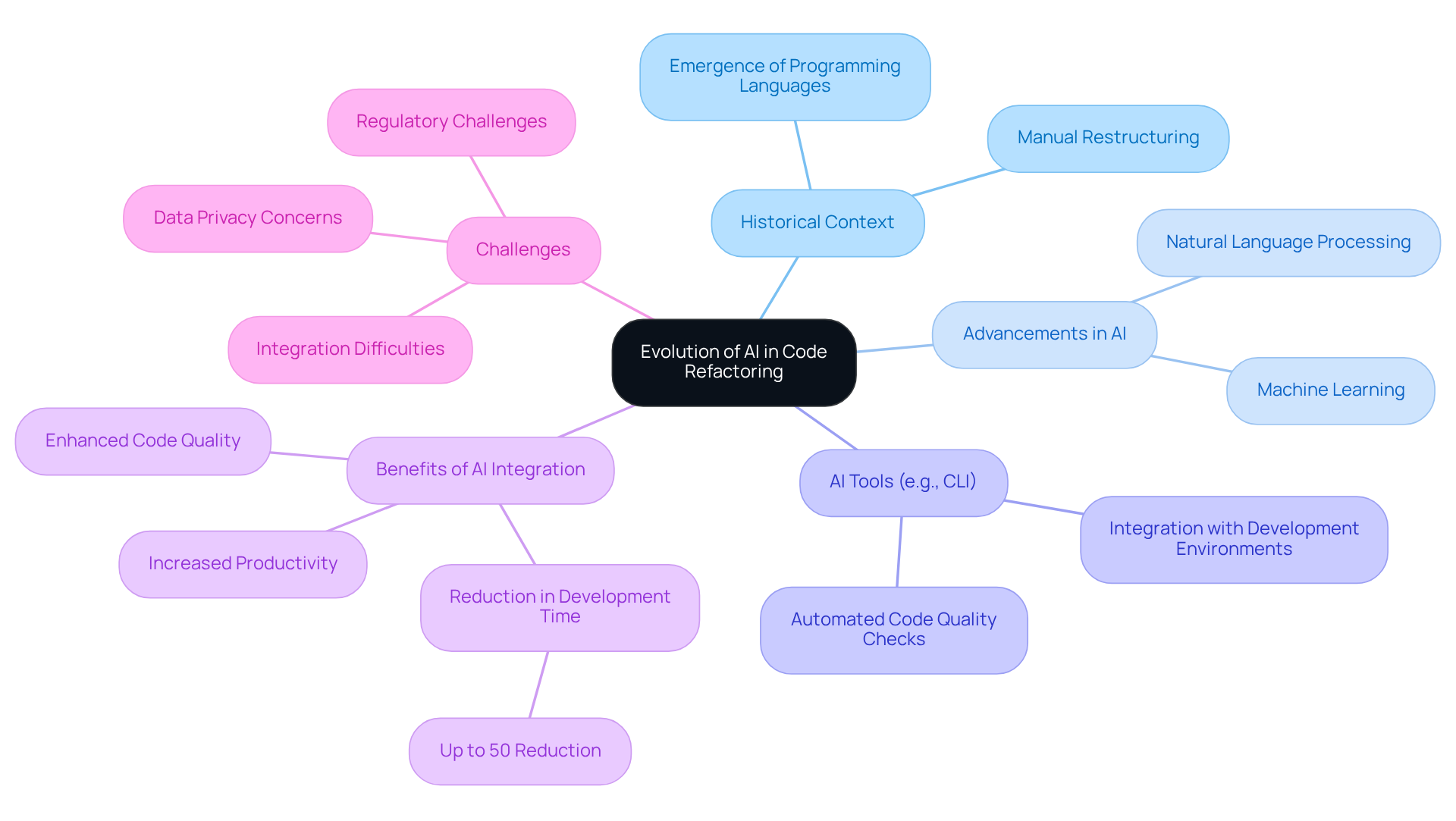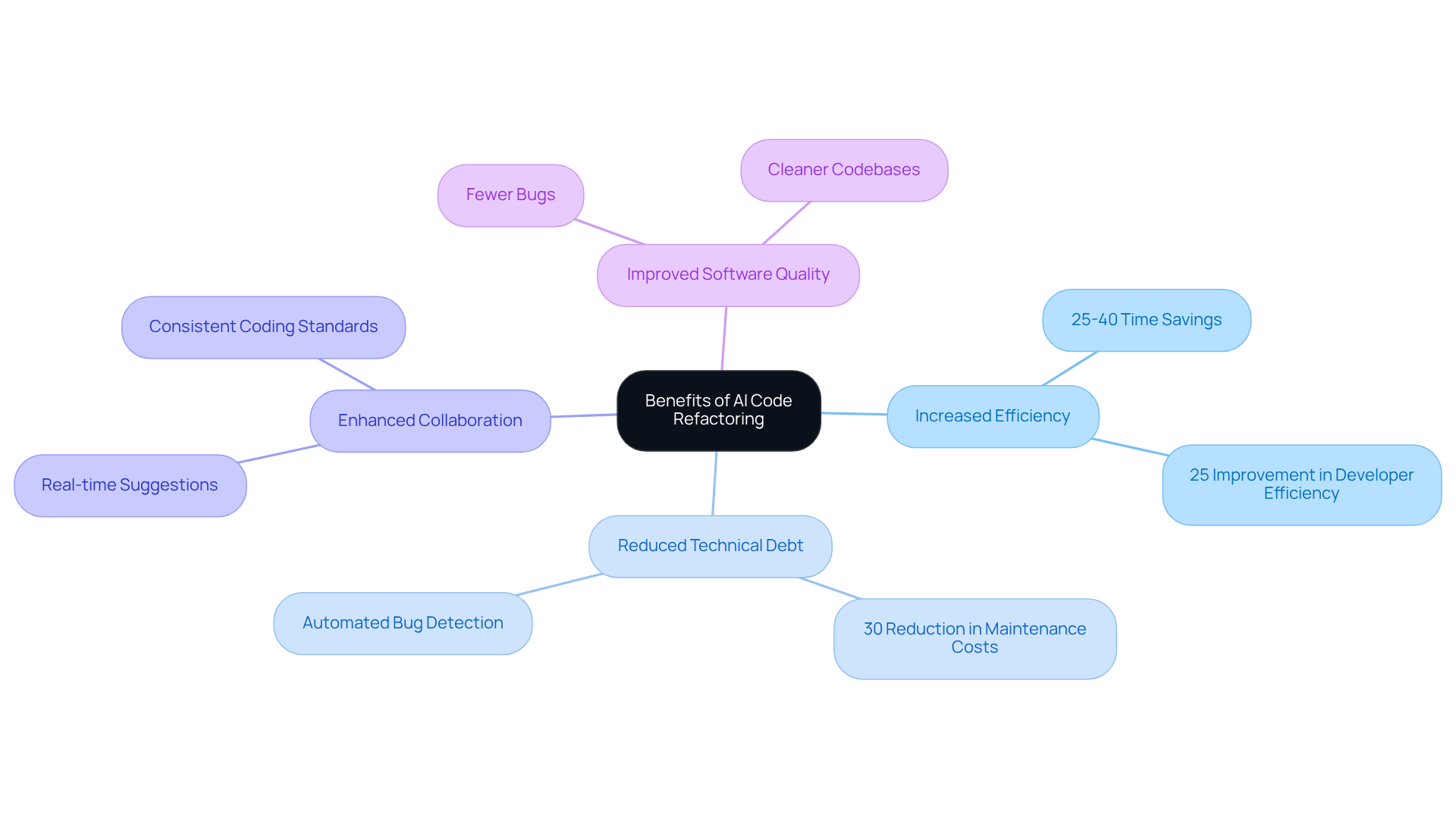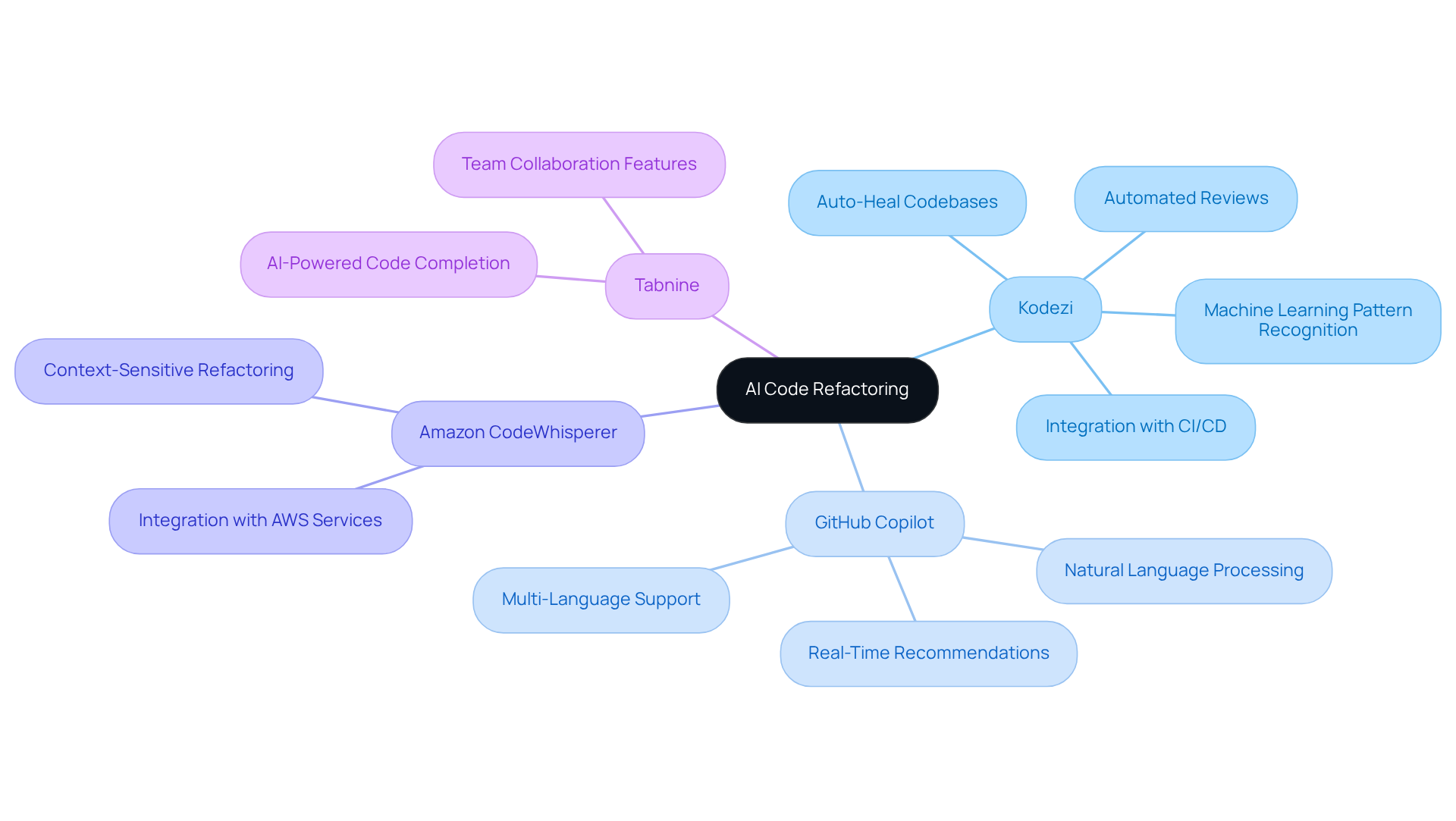Overview
In today's fast-paced software development environment, developers often face significant coding challenges. These challenges can lead to decreased productivity and compromised code quality. However, tools like Kodezi are transforming the landscape of code refactoring. By automating code restructuring, Kodezi not only improves maintainability but also helps teams effectively manage technical debt.
Imagine a scenario where your team spends countless hours on code maintenance instead of focusing on new features. With Kodezi, these hours can be drastically reduced. The tool's AI-driven capabilities streamline the refactoring process, leading to substantial efficiency gains. In addition, Kodezi enhances the overall quality of the software, making it easier for developers to work collaboratively and deliver high-quality products.
What if you could boost your team's productivity while ensuring that your code remains clean and maintainable? Kodezi offers just that. By utilizing advanced features designed specifically for developers, it empowers teams to tackle coding challenges head-on. Furthermore, the platform provides valuable insights into your codebase, allowing for proactive management of potential issues before they escalate.
Take action today and explore the powerful tools available on Kodezi. Experience firsthand the benefits of improved productivity and enhanced code quality. Don't let coding challenges hold you back; embrace the future of AI-driven code refactoring with Kodezi.
Introduction
In the dynamic realm of software development, developers face the ongoing challenge of maintaining clean, efficient code. This is where AI code refactoring comes into play as a transformative solution. By leveraging advanced technologies, it optimizes existing code and enhances functionality. As organizations increasingly adopt AI-driven tools like Kodezi, the potential for improved software quality and developer productivity becomes apparent. However, this raises an important question: can these intelligent systems truly grasp the nuanced context of coding, or do they risk oversimplifying complex problems?
Furthermore, Kodezi addresses these challenges with specific features designed to streamline the coding process. By automating routine tasks, it allows developers to focus on more complex aspects of their work. In addition, the platform offers real-time feedback, enabling users to make informed decisions quickly.
The benefits of using Kodezi are significant, leading to improved productivity and enhanced code quality. Developers can expect to save time and reduce errors, ultimately resulting in a more efficient workflow. Similarly, organizations that implement Kodezi often see a marked increase in overall software quality.
As you consider the tools available on the platform, reflect on your own coding practices. Are there areas where automation could enhance your efficiency? Exploring Kodezi may provide the solution you need to elevate your development process.
Define AI Code Refactoring: An Overview
In the ever-evolving landscape of software development, developers frequently encounter significant coding challenges. AI program restructuring acts as a guide to AI code refactoring, utilizing artificial intelligence technologies to enhance the internal organization of existing scripts while preserving their external functionality. This innovative practice, exemplified by Kodezi, aims to improve software quality, maintainability, and performance by automating repetitive tasks and offering suggestions based on established best practices.
Kodezi addresses these challenges with remarkable features. Unlike conventional code restructuring, which often necessitates manual intervention, AI-driven code modification employs machine learning algorithms and natural language processing to analyze codebases, identify inefficiencies, and propose optimized solutions. Furthermore, Kodezi provides automated debugging capabilities that swiftly detect and resolve programming issues, ensuring adherence to the latest security best practices and coding standards. This capability not only accelerates the restructuring process but also minimizes the risk of introducing errors, making it an invaluable asset for modern software development teams.
The benefits of using Kodezi are clear. By addressing performance bottlenecks and improving formatting, Kodezi contributes significantly to overall code quality. Real-world applications of AI in software refactoring demonstrate substantial advantages. For instance, groups that incorporate AI resources report a 70% correlation between productivity increases and enhanced software quality. In addition, as companies progressively embrace AI-powered solutions, forecasts suggest that by 2025, two-thirds of businesses will employ AI for internal automation activities, such as reviewing software and ensuring quality.
However, it's important to note that 65% of developers utilizing AI for code restructuring express concerns about the assistant overlooking relevant context. This emphasizes the necessity for improved contextual comprehension in AI tools. Interestingly, those who encounter fewer than 20% hallucinations in AI outputs are 2.5 times more likely to integrate software without additional evaluations, underscoring the significance of precision in AI-generated recommendations.
As CG Seetharaman, Chief Technology Officer, states, "AI is deeply transforming software development — it's essential, not optional." This sentiment reflects the growing recognition of AI's role in enhancing software engineering practices. In summary, the guide to AI code refactoring not only streamlines the development process but also plays a crucial role in maintaining high standards of quality and long-term maintainability, positioning it as a key component of modern software engineering. Are you ready to explore the tools available on Kodezi's platform and elevate your coding practices?

Explore the Evolution of AI in Code Refactoring
The evolution of artificial intelligence in program restructuring has its roots in the early days of software creation, when restructuring was primarily a manual endeavor. As programming languages and frameworks grew more complex, the need for effective restructuring solutions intensified. The advent of AI technologies, especially machine learning and natural language processing, is essential in the guide to ai code refactoring, marking a pivotal shift. These innovations enabled tools to analyze programming structures, recognize patterns, and suggest improvements automatically.
Furthermore, the guide to ai code refactoring highlights that AI-driven refactoring tools have become increasingly advanced, adept at managing extensive codebases and integrating seamlessly with development environments. This transformation reflects a broader trend in software engineering towards automation and efficiency, allowing developers to focus on higher-level tasks while AI navigates the intricacies of maintenance.
In addition, the CLI serves as a prime example of this trend, designed specifically for B2B engineering teams. It enhances code quality and resolves bugs before they reach production, embodying the mission to boost programming productivity. By automating codebase healing, the CLI application significantly reduces debugging time and optimizes workflows.
With AI implementation in software development projected to rise by 53% annually, and 67% of companies already leveraging some form of AI, a guide to ai code refactoring will be increasingly important. Notably, 75% of software executives report up to a 50% reduction in development time thanks to AI integration. However, challenges like data privacy and security concerns continue to loom.
The platform distinguishes itself by revitalizing existing codebases rather than merely creating new software. This positions it as a vital resource for teams managing quality and technical liabilities.

Identify the Benefits of AI Code Refactoring
In the world of software development, coding challenges are a common hurdle that many developers face. Technical debt can consume a significant portion of their time, with studies showing that developers spend 25-40% of their efforts addressing these issues. This is where Kodezi steps in, offering a guide to ai code refactoring that automates repetitive tasks and helps identify code smells, such as duplicated code or overly complex methods, leading to cleaner and more maintainable codebases.
Kodezi’s CLI tool is designed specifically for B2B engineering teams, enhancing programming productivity by resolving bugs before they reach production. This allows developers to focus on more advanced tasks, ultimately improving their efficiency. Furthermore, AI-driven code restructuring fosters better collaboration among team members by promoting consistent coding standards and practices. For instance, Kodezi provides real-time suggestions that guide developers in adhering to best practices, resulting in fewer bugs and faster development cycles.
Organizations that have integrated Kodezi into their refactoring processes often refer to the guide to ai code refactoring, reporting significant improvements in debugging efficiency. With over 1,000,000 users praising its user-friendly features, the tool not only streamlines development but also transforms technical debt into a manageable aspect of software maintenance, thereby enhancing overall productivity. Additionally, Kodezi's ability to analyze historical changes allows it to learn from previous errors, continuously improving its suggestions and supporting long-term software health.
As Jean-Francois Tarabbia pointed out, leveraging AI for visibility and automated remediation enables enterprises to turn technical debt from a roadblock into a catalyst for long-term software excellence. A case study of a global financial services company revealed a remarkable 25% increase in developer efficiency through AI-driven programming analysis. Moreover, Kodezi's guide to ai code refactoring guarantees that refactored scripts do not introduce new flaws or setbacks, further solidifying its role in maintaining software quality.
Are you ready to experience these benefits firsthand? Kodezi offers a 5-minute quickstart and the opportunity to see a demo, making it easier than ever to enhance your coding practices.

Examine Tools and Techniques for AI Code Refactoring
Developers often face significant challenges in coding, from managing complex codebases to ensuring high-quality outputs. Kodezi provides a guide to AI code refactoring through its innovative features designed specifically for programming restructuring. By utilizing AI-driven capabilities, Kodezi enables teams to auto-heal codebases in seconds, ensuring that time spent on pull requests is minimized.
Furthermore, tools like GitHub Copilot, Amazon CodeWhisperer, and Tabnine enhance developer efficiency by providing real-time recommendations and context-sensitive refactoring options. Among these, Kodezi stands out as a versatile resource, allowing teams to identify areas for enhancement through automated reviews and machine learning-driven pattern recognition.
In addition, integrating these resources into CI/CD pipelines is essential for maintaining software quality throughout the development lifecycle. This proactive approach allows teams to detect and resolve issues early, ultimately enhancing their workflows and productivity. With the global AI code tools market projected to grow at a compound annual growth rate of 27.1% from 2024 to 2030, a guide to AI code refactoring is essential for engineering teams adopting advanced solutions like Kodezi.
Are you ready to elevate your coding practices? Explore the powerful tools available on Kodezi's platform and unlock the potential for improved efficiency and better management of technical debt.

Conclusion
In the realm of software development, developers frequently encounter significant coding challenges that can hinder productivity and code quality. AI code refactoring emerges as a transformative solution, leveraging artificial intelligence to enhance code maintainability and automate repetitive tasks. Tools like Kodezi address these challenges effectively, streamlining the restructuring process while ensuring adherence to best practices.
Kodezi significantly improves debugging efficiency and overall productivity through its innovative features. By harnessing machine learning and natural language processing, Kodezi identifies inefficiencies and provides real-time suggestions. This allows developers to focus on more complex tasks, ultimately elevating their coding practices. Furthermore, the evolution of AI in code refactoring signifies a shift towards automation, with an increasing number of organizations recognizing the potential for enhanced software quality and reduced technical debt.
Embracing AI-powered code refactoring tools like Kodezi is essential for teams striving to maintain high standards in software development. As the industry continues to evolve, the integration of AI technologies not only improves efficiency but also transforms technical challenges into opportunities for innovation and excellence. Explore the tools available on Kodezi's platform to elevate your coding practices and experience these benefits firsthand.
Frequently Asked Questions
What is AI code refactoring?
AI code refactoring is the process of using artificial intelligence technologies to enhance the internal organization of existing code while maintaining its external functionality. It aims to improve software quality, maintainability, and performance by automating repetitive tasks and providing suggestions based on best practices.
How does Kodezi contribute to AI code refactoring?
Kodezi enhances AI code refactoring by employing machine learning algorithms and natural language processing to analyze codebases, identify inefficiencies, and propose optimized solutions. It also offers automated debugging capabilities to quickly detect and resolve programming issues.
What are the benefits of using Kodezi for code refactoring?
The benefits of using Kodezi include improved code quality, performance optimization, and better formatting. It helps address performance bottlenecks and ensures adherence to security best practices and coding standards, thus minimizing the risk of errors.
What is the correlation between AI usage and software quality?
Real-world applications of AI in software refactoring show a 70% correlation between increased productivity and enhanced software quality among teams that incorporate AI resources.
What are the concerns developers have regarding AI in code restructuring?
65% of developers using AI for code restructuring are concerned that the AI assistant may overlook relevant context, highlighting the need for improved contextual understanding in AI tools.
How does the occurrence of hallucinations in AI outputs affect developer trust?
Developers who experience fewer than 20% hallucinations in AI outputs are 2.5 times more likely to integrate software without additional evaluations, indicating that precision in AI-generated recommendations is crucial for trust.
What is the future outlook for AI in software development?
Forecasts suggest that by 2025, two-thirds of businesses will employ AI for internal automation activities, including reviewing software and ensuring quality, reflecting the growing importance of AI in software engineering practices.




